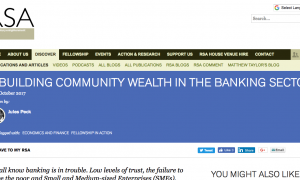
Building Community Wealth in the banking sector
This piece is a blog on the RSA’s website where Jules is a Fellow We all know...
Expert Adviser; Writer; Founding Member of Jericho Chambers

Download Jules' Project Sunlight Pamphlet

There is rising consensus that the economic system is broken.Legendary fund manager Jeremy Grantham recently said, “Capitalism does millions of things better than the alternatives. However, it is totally ill-equipped to deal with a small handful of issues. Unfortunately, they are the issues that are absolutely central to our long-term wellbeing and even survival.”
But, despite the fact that there are many alternative visions of economics out there, due partly to Thatcher’s mind-numbing TINA legacy, there is little attempt to build towards them.
I put our mental block on seeking alternative forms of economics down to a stale, baggage-laden dialectic, which poses our search for prosperity as simply a binary choice between markets or society; left or right; state or private; ‘capitalism’ or‘socialism’. But as Professor Erik Olin Wright shows in Envisioning Real Utopias, our current economics is in fact already a complex hybrid of ‘capitalism’ and more socialised socio-economics.
The FT’s Martin Wolf says our economics is a system to “privatise profits and socialise risks”. What might it look like if we shifted to a system which socialised both the profits and the risks, in which we all shared the good and the bad? In which the meaning of life and the purpose of economics, enterprise and politics were to seek to maximize Good Lives for all within planetary limits?
What if there is such a thing as society and we could turn to the power of thecitizen, of collective and co-operative action to explore a new landscape for economics? Might a new coalition of the willing, from diverse backgrounds, come together and find common ground around such a new vision?
We know what brings true flourishing of wellbeing, and we know that the consumerist-debt based ‘privatised keynesianism’ we are locked into has led us to an age in which, as Tim Jackson says in his TED lecture, “we spend money we don’t have, on things we don’t need, to impress people we don’t even care about.”
I’m a child of the seventies, when The Good Life was as popular as The Apprentice is today. One celebrated wellbeing-enhancing intrinsic values of simple living and community; the other exhibits all that is wrong with society today.
The ‘70s was also when UK life satisfaction started to flat-line. Neo-liberalism and economic growth since then has brought us no increase in wellbeing whilst locking us into debt and the jaws of runaway climate change.
Thomas Carlyle once said: “If something be not done, something will do itself one day, and in a fashion that will please nobody.”
So we urgently need a new plan. It’s time to reconsider the nature of Good Lives, and the economics that might support their flourishing.
Copyright 2014 Jules Peck. Jericho Chambers
Leave a Reply